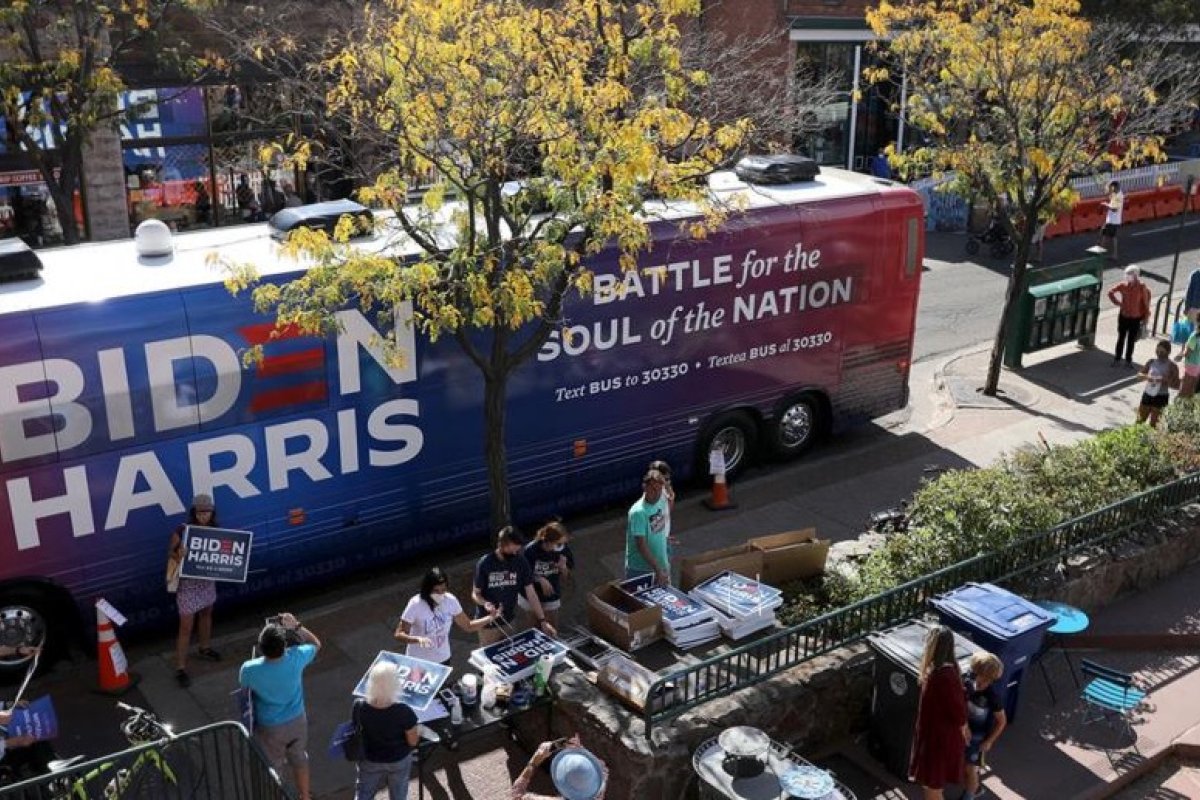
The Soul of the Nation?
A campaign slogan raises interesting questions about what, exactly, we're all fighting for
Sometimes a sighting of religion in public life is obvious and yet complex enough to need interpretation. That is one job of Sightings columns. Today’s column hopes to reach some understanding of the amazing claim that the 2020 election is “a battle for the soul of the nation.” Some Evangelicals see President Trump in the role of Cyrus who will restore faith to the nation. The Biden campaign, for its part, named the election a war for the soul of the nation. What are we to make of religiously fraught language when applied to a nation-state?
§1
Many people might have no idea what “soul” originally meant, but a Sightings column should wonder about the political adequacy of ancient ideas of soul, say, psyché (Greek), anima (Latin), or the Hebrew (nephesh, ruach, and other terms) that bear religious meanings. Those meanings hovered around the idea of a vital principle, and also breath and wind. They were applied, mainly, to human beings, although Plato analogized the State on the tripartite human “soul.” The West’s medieval thinkers like Thomas Aquinas talked about the vegetative, sensitive, and intellectual souls. Human beings possess all three; other living things have their distinctive “souls.” After all, God blew the breath of life only into the dust creature (Adam) and animated it. Biblically speaking, human beings are “dust that breathes” (e.g., Gen, 2:7; Gen 3:19; Ps 103:14; I Cor 15:47).[1] Greek and Roman thinkers also saw, in different ways, that human beings are mixed beings, that is, bodies and yet something else as well. Death is the soul leaving the body.
The phenomenology of soul here is that, as human beings, we are at odds with ourselves, seeking to escape or reconcile the tensions that riddle human life personally and socially. The question is, then, does it make sense to speak of a “nation’s” vital principle at odds with itself? What is the tension, if there is one, at the root of the nation’s soul? Could it be that what animates this nation, its soul, is precisely the question of what does and ought to animate our political life together? Might we find that animating principle inscribed in our founding document, as well as at play in public life? So, next, consider some facts (yes, there are facts) to get a sense of the highly charged and polarized condition of the nation.
§2
Fact: our political situation is riven with clashes over the propriety of religious teachings on the political scene. Fact: many protesters against mask mandates base their complaints in their religious liberty. Fact: some of President Trump’s followers endorse his attack on the media and even scientific statements of truth. Activists left and right often struggle to constrict freedom of speech and even banish opposing positions from public life. Not only religion but freedom of speech is disputed. Fact: Groups sometimes dubbed the Alt Right insist on their right of assembly even if it should turn violent. Fact: a national debate about policing is rightly underway to insure that the rights and liberties of citizens can be peaceably exercised. Importantly, the tensions or fault lines in the republic at play in public life cluster around the freedoms inscribed in the First Amendment of the Constitution.
Can the nub of the issue about the soul of the nation be teased out from the chatter, acrimony, and, well, nonsense? One might say that what animates a democracy is, in reality, the dispute over the relation between standards for ultimate loyalties (religious or otherwise) and penultimate loyalties. The First Amendment seems to inscribe the necessary conditions for that dispute and thereby protect the democratic soul. That is, the rights to freedom of religion, speech, and assembly appear as conditions needed for people to answer one of the most basic political questions: who or what should rule us?[2] Can people rule themselves in various forms of democracy, or will the state rule people for its purposes—say, in an oligarchy or tyranny? What will be the order of the nation’s governance over its animating freedoms and rights?
The question of rule or governance is not just a political question, at least not for the monotheistic religions, nor, if I am right, for the First Amendment. Recall that, according to Deuteronomy 17:14-20, any King of Israel should be of God’s choosing. The tribe of Judah disregarded that divine demand and installed David as King. Things get complicated, at least for Christians, when Jesus is said to be of the family and lineage of David. Christ the King has taken many political forms, ranging from the divine right of kings to holy empires, but also as attacks on tyrants by those, like Dietrich Bonhoeffer, the Confessing Church, and the Civil Rights movement in the USA, who follow a servant Christ. Here again is the relation between ultimate and penultimate convictions, that is, convictions about the standards and ideals that ought to order social life and thus rule over us.
§3
The tension and debate in our current political world is, in one sense, precisely what our first amendment liberties were intended to foster in non-violent ways. The amendment is an inscription of the nation’s “soul.” The dispute at the heart of our republic that animates political life is, then, between commitments to different standards of right and wrong, as well as of fact and fiction and truth and falsehood in determining who should rule and how one should rule. The pitch of the battle for the soul of the nation is whether or not we the people will assume the burden of peaceful self-governance.
Something has now changed among us, as the facts noted above show; the tensions have seemingly gone off track. Debate has morphed into armed conflict in our streets.[3] Heretofore there has been a broad, if ill-defined, consensus, too often only held in the breech, that it is precisely in debating, contesting, and determining the standards of governance without resort to violence that preserves the vitality, freedom, and equality of a democratic nation. Democracy lives or dies in terms of the freedom that citizens possess to determine who should rule, but a freedom bound to standards of right and wrong, fact and fiction, truth and falsehood. Democracy is a communicative reality that withers when silence, or a dreadful monotone, rules by dint of unjustified violence. Freedom of religion, speech, and assembly for everyone are necessary conditions for that non-violent work of self-governance. Thinkers like Hannah Arendt, Vaclav Havel, Martin Luther King, Jr., John Lewis, and others, have attested that when standards of fact, truth, and, right no longer vitalize public debate about self-government, then tyranny engulfs a people.[4] We need to reaffirm first amendment liberties as a bedrock of our democracy so as carefully to delineate the boundaries of acceptable conflict and how those boundaries are to be policed.
It seems, in this light, that the USA might be on the brink of unjustified, violent, and thus non-democratic resolutions about governance. The battle for the soul of the nation now requires beating swords into ballots in order peacefully to determine the consent of the governed. Vote.
[1] See William Schweiker, Dust that Breathes: Christian Faith and the New Humanisms (Wiley-Blackwell, 2010)
[2] The political philosopher Isaiah Berlin was fond of this question. See Isaiah Berlin, The Proper Study of Mankind: An Anthology of Essays (Farrar, Straus and Giroux; First Edition, 2000), especially “Two Concepts of Liberty,” 191-224.
[3] See Emily Bazelon, “Freedom of Speech will Save our Democracy,” in The New York Times Magazine (October 18, 2020): 26ff.
[4] The works of these luminaries are well known but they pay special reward to the reader during our troubled times.
Photo: The Biden-Harris campaign bus displays its logo at an event in Flagstaff, AZ. Jake Bacon | Arizona Daily Sun.
Sightings is edited by Daniel Owings, a PhD Candidate in Theology at the Divinity School. Sign up here to receive Sightings via email. You can also follow us on Facebook and Twitter. The views and opinions expressed in this article are those of the author and do not necessarily reflect the position of the Marty Center or its editor.


